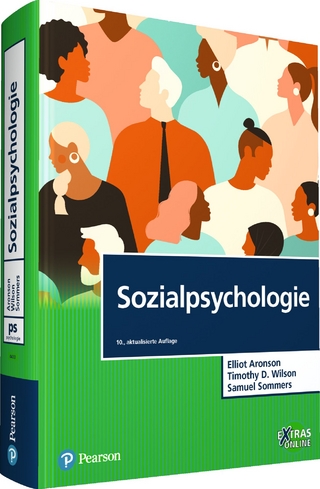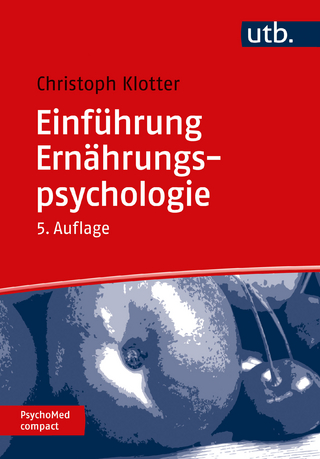
Cyberpsychology and Society
Routledge (Verlag)
978-1-138-06352-5 (ISBN)
Human interaction with technology is constantly evolving, with rapid developments in online interaction, gaming, and artificial intelligence all impacting upon and altering our behaviour. The speed of this change has led to an urgent need for a new field of study, cyberpsychology, in order to investigate the ways in which human behaviour is affected by the addition of technology, and the benefits and risks thereof.
Cyberpsychology and Society does not offer a description of or justification for the field of study, but is rather a presentation of some of the most recent research in many key sub-topics within the area. Based on the work being done in the Institute of Art, Design and Technology (IADT) in Dublin, Ireland, Cyberpsychology and Society brings together a unique collection of writings by contributors on cyberpsychology in relation to health, education, gaming, consumer behaviour, and social change in an online world. The book focuses on the impact of societies’ increasing interaction with technology, and is a presentation of some of the most recent research in the area.
Describing cutting-edge research while employing a tone which is accessible to both students and academic staff, this book is an invaluable resource for students, researchers and academics of cyberpsychology and related areas.
Andrew Power is Registrar and Chief Academic Officer at the Institute of Art, Design and Technology (IADT). Andrew is an active researcher in the area of technology and society and has published extensively in this field. Originally qualified as an engineer, Andrew has postgraduate qualifications in Music, Business Administration, Art History, and a Doctorate in Governance from the School of Law in Queens University Belfast.
Academix team
Acknowledgements
Introduction
Andrew Power
PART 1
Cyberpsychology and wellbeing
1. The therapeutic relationship in therapy delivered via email: the therapist’s perspective
Macarena Pérez Bullemore and Hannah Barton
2. Virtual nature, mindfulness, and the potential for altruism
James Glennon and Hannah Barton
3. Exploring health anxiety and dependence in healthy adult users on m-Health apps and wearables
Eve Conboy, Cliona Flood, and Andrew Power
4. What motivates a ninja? An exploration of students’ CoderDojo experience
Natalie Butler, Cliona Flood, and Andrew Power
PART 2
Cyberpsychology and social change
5. Labyrinth of passion on Facebook: individuals’ attitudes towards electronic observation of romantic partners
Fransisco Collazo, Ellen Brady, and Andrew Power
6. Cybertrends: an exploratory study of why individuals conform on social networking sites
Louise O’Hagan, Hannah Barton, and Andrew Power
7. Homophobic words, face to face and online: an emotional hit and run
Leo Carroll, Hannah Barton, and Andrew Power
8. Public Wi-Fi and risk: are individual differences associated with the decision to connect?
Angela Ryan and Andrew Power
PART 3
Cyberpsychology and the gaming society
9. Predictors of video game addiction: genre, gaming motivations, and trait psychological need satisfaction
Eric Ekman, Brendan Rooney, and Andrew Power
10. Mining through maths: Minecraft play and mathematical problem solving
Laura Griffin and Robert Griffin
11. Moving through the Uncanny Valley: the effect of technological familiarity and movement perception on the uncanny ratings of digital humanoids
Shula Castle O’Dowd and Hannah Barton
12. Violent app games and the general aggression model: arousal, affect, and access to aggressive thoughts
Patrick Kennedy, Nicola Fox Hamilton, and Robert Griffin
PART 4
Cyberpsychology and consumer behaviour
13. Social norms in deception detection in online and offline communication: understanding individual perspectives in a qualitative thematic analysis
Catherine Friend, Nicola Fox Hamilton, and Andrew Power
14. What makes you double-tap? A qualitative exploration of effective engagement with brands on Instagram
Dominique O. Yong, Nicola Fox Hamilton, and Sinéad Meade
15. The role of perceived relative advantage and channel choice in influencing consumer adoption of self-service facilities for managing insurance policies
Chelsea Uddo, Nicola Fox Hamilton, and Andrew Power
16. From ‘like’ to ‘buy’: the effect of Facebook fan page type posts on purchase intention
Michelle Murray, Nicola Fox Hamilton, and Andrew Power
17. The non conclusion
Andrew Power
Index
| Erscheinungsdatum | 13.06.2018 |
|---|---|
| Verlagsort | London |
| Sprache | englisch |
| Maße | 156 x 234 mm |
| Gewicht | 610 g |
| Themenwelt | Geisteswissenschaften ► Psychologie ► Sozialpsychologie |
| Mathematik / Informatik ► Informatik ► Web / Internet | |
| Mathematik / Informatik ► Mathematik | |
| Sozialwissenschaften ► Soziologie | |
| ISBN-10 | 1-138-06352-5 / 1138063525 |
| ISBN-13 | 978-1-138-06352-5 / 9781138063525 |
| Zustand | Neuware |
| Haben Sie eine Frage zum Produkt? |
aus dem Bereich


